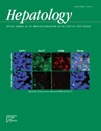Is achievement of sustained virologic response an independent predictor or a cofactor for the development of esophageal varices?†
Potential conflict of interest: Nothing to report.
We read with great interest the study by Bruno et al., which concluded that achievement of sustained virologic response prevents the development of esophageal varices in patients with compensated hepatitis C virus (HCV)-induced cirrhosis. Their multivariable analysis also showed that HCV genotype 1b is an independent predictor for the development of esophageal varices.1 The interpretation of the results, however, raises a concern.
It is well known that the clinical outcome of antiviral therapy is significantly influenced by viral genotype.2, 3 That is to say, patients with different HCV genotypes may have different responses to the antiviral therapy. This is confirmed by the observation that patients infected with genotype 1b have lower rate of sustained virologic response.1 Therefore, HCV genotype 1b may be more likely to be an independent predictor for the development of esophageal varices, and achievement of sustained virologic response may be merely a cofactor associated with the host response to antiviral therapy. Further study is needed to clarify this concern.
References
Li-ping Ye M.D.*, Xin-li Mao M.D.*, * Department of Gastroenterology Taizhou Hospital of Zhejiang Province Linhai, China.




